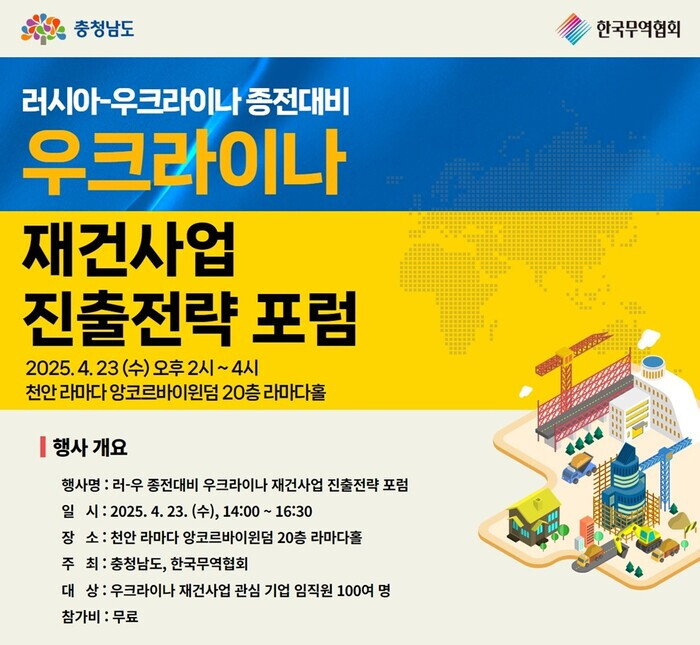
Cheonan, South Korea - As discussions regarding the end of the Russia-Ukraine war gain momentum, Chungnam Province is actively seeking avenues for its local businesses to participate in the anticipated massive reconstruction projects in Ukraine. The Korea International Trade Association (KITA) Daejeon, Sejong, and Chungnam Regional Headquarters, in collaboration with Chungnam Province, hosted the "Ukraine Reconstruction Project Participation Strategy Forum" on April 23rd at the Ramada Encore Hotel in Cheonan. The forum garnered significant attention, drawing over 90 export-oriented small and medium-sized enterprises (SMEs) from the Chungnam region, along with representatives from relevant organizations including the Chungnam Regional Small and Medium-sized Venture Business Administration and the Chungnam Economic Promotion Agency.
The primary objective of the forum was to provide regional companies with practical strategies for engaging in the Ukrainian reconstruction efforts, particularly as the post-conflict recovery phase looms.
The first presentation was delivered by Dr. Lee Cheol-won, a senior research fellow at the Korea Institute for International Economic Policy (KIEP). Dr. Lee provided an overview of the progress of the Ukraine Recovery Conference (URC) and the financial support being offered by major international financial institutions such as the Multilateral Investment Guarantee Agency (MIGA), the European Bank for Reconstruction and Development (EBRD), and the International Finance Corporation (IFC). He emphasized that "securing local networks and understanding the relevant regulations will be key to future market entry." These institutions have pledged substantial financial aid to Ukraine. The EU, including its member states, remains Ukraine's largest and most stable donor and foreign investor, having disbursed €7.5 billion this year under the Ukraine Plan and exceptional Macro-Financial Assistance (MFA) loan, with up to €23.1 billion expected throughout 2025. The EBRD has made over €6 billion available to support Ukraine's real economy since the full-scale invasion in February 2022 and is prepared to significantly increase investment post-conflict. The IFC has also been actively supporting Ukraine's private sector through its Economic Resilience Action (ERA) Program, providing over $650 million in financing and mobilizing over $400 million since 2022. MIGA has issued $227 million in guarantees since the invasion, leveraging donor funds to support essential trade and lending.
Following Dr. Lee, Ms. Cho Eun-jin, an attorney at Yulchon LLC, analyzed the fluidity of Ukraine's legal and political systems, including potential variables related to presidential elections. She provided practical guidance on navigating international bidding systems, participating in Public-Private Partnership (PPP) projects, establishing local entities, and obtaining necessary construction licenses. Ms. Cho's insights aimed to demystify the operational procedures for participating companies. Establishing a company in Ukraine involves defining the legal structure and submitting incorporation documents, a process that can take 2 to 12 days. Obtaining construction licenses depends on the type of work, categorized from CC1 (significant public importance) to CC3.
The final presentation featured Mr. Kang Ki-woong, Vice President of AITalksy Co., Ltd., who shared his company's experience as the first Korean firm to establish a joint venture in Ukraine. He presented various business models, including K-beauty distribution strategies, the export of combined heat and power plants, and participation in public sector bids for pickup trucks. Mr. Kang stated that "participating in the reconstruction projects is both a challenge and an opportunity to pioneer new markets." Ukraine's beauty and personal care market is projected to grow significantly, presenting opportunities for K-beauty products. There is also a need for energy infrastructure, including combined heat and power units, and vehicles like pickup trucks for public institutions.
Mr. Kim Yong-tae, head of KITA's Daejeon, Sejong, and Chungnam Regional Headquarters, emphasized the need for new growth strategies for local businesses amidst the increasing uncertainty in the global trade environment, particularly highlighting the protectionist trade policies of the Trump administration. He noted that "as the uncertainty in the trade environment grows due to the protectionist stance of the Trump administration, local companies need new growth strategies such as diversifying export markets, making local investments, and participating in procurement markets." He expressed hope that "this forum will serve as an opportunity for companies to proactively respond to global changes." The Trump administration has recently declared foreign trade practices a national emergency and has imposed responsive tariffs, signaling a move towards greater protectionism and reciprocal trade measures. This necessitates that exporting nations explore diverse markets and investment opportunities to mitigate risks. The need for export diversification is crucial for sustained economic growth and stability, especially for countries heavily reliant on international trade.
[Copyright (c) Global Economic Times. All Rights Reserved.]






























